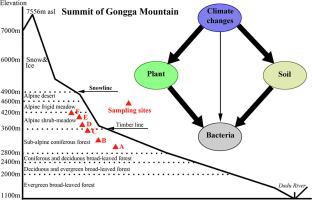Catena ( IF 5.4 ) Pub Date : 2020-06-12 , DOI: 10.1016/j.catena.2020.104727 Hongyang Sun , Yanhong Wu , Jun Zhou , Haijian Bing , He Zhu

|
Alpine zones have a clear climate gradient and are ideal sites for understanding the long-term effects of climate change on ecosystems. As the most sensitive population to environmental changes, the alpine bacterial community is likely to be a microbial indicator of climate change. However, the effects of climate, vegetation and soil factors on the bacterial community are often confounding along an altitudinal gradient. In this work, we utilized alpine zones with similar soil parent material and topography to examine bacterial communities and environmental parameters on Gongga Mountain. We aimed to tease apart the effects of climate, vegetation and soil factors on the bacterial community. The bacterial communities were dominated by Acidobacteria, Proteobacteria, Actinobacteria, Planctomycetes, Bacteroidetes and Chloroflexi, which accounted for 82–92% of all bacterial sequences. Bacterial communities showed different distribution trends with increasing altitude. The bacterial community composition showed significant clustering relative to the vegetation landscape. Our analyses showed that, in terms of direct effects, soil properties played a more important direct role in controlling the distribution pattern of the bacterial community compared with climate and vegetation parameters. A path model based on climate drivers indicated that the climate had the largest effect on the bacterial communities by affecting vegetation and soil properties. This result suggested that the alpine bacterial communities were ultimately shaped by the climate. However, this also suggested that climate change could not alter the bacterial communities if the changes were not great enough to alter vegetation and soil properties. Furthermore, the present study also hints at opportunities and challenges for using microbial changes as indicators of climate change.











































 京公网安备 11010802027423号
京公网安备 11010802027423号